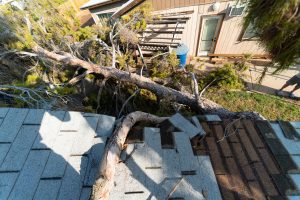
When the spring season comes, we’re treated to sunshine, refreshing warmth, and the beautiful sights of nature. However, spring also means rain, storms, and the potential for tornadoes. With such weather, there’s a chance that your home, business, or other property will suffer storm damage. Storms can feature strong winds that can force trees and other upright objects to be knocked over, potentially falling onto your residential or commercial property. Heavy rainstorms, especially, can cause disastrous damage to your property, including serious water damage and flooding.
However, while severe weather is inevitable, storm damage to your property isn’t something you have to go through. If you take the necessary steps, you can safeguard your home and prevent storm damage from occurring.
Use the following information as a guide to help you prepare your home or business for storms this spring and to prevent your property from suffering storm damage.
Inspect Your Property’s Exterior
Your property’s exterior provides protection against weather and other outside elements. As such, if your home or business’s exterior is made up of material in need of repair or replacement, then you need to have these issues addressed.
Roofing and Siding
The roof acts as protection for any property, but it cannot provide proper protection if it is not well-maintained. Inspect your roof for any missing or damaged shingles, and replace them to ensure your roof is in the best condition to function. Otherwise, any loose or damaged shingles will be more prone to becoming damaged, leaving your property more vulnerable to further damage.
Much like roofing, siding needs to be in good condition to act as protection. Loose siding can easily become torn off during a storm due to strong winds.
Gutters and Downspouts
Your property’s gutters are especially important during a storm-heavy, rain-filled season like spring. If they are damaged, then they cannot properly guide water away from your home. If gutters don’t guide water away from your home, the rainwater will likely accumulate near your property and cause water damage. Knowing this, check for any damage to your gutters, and have them repaired or replaced as necessary. Be sure to also check that the downspouts also direct water far enough from your property. If not, then you can purchase extensions to ensure water is directed far enough away from your home or business. When you check your gutters, clean them out as well. Clogged gutters make for ineffective gutters.
Perform Yard Maintenance
If you have any trees in your home’s yard, then you may need to conduct some maintenance to prevent them from causing any storm damage to your property. If trees are close enough to your home, high winds can cause their branches — if not the entire tree itself — to break off and crash into your home. If the branch is large enough, it can be severely damaging.
Your yard itself may also need work done. The grading of a yard refers to its slope, and improper grading can cause water to build up in your lawn or pool up by your home instead of being directed out to a drain. Your yard should slope downward, away from your home in all directions. Every 10 feet, the lawn should drop two or three inches. If you inspect your lawn and find this isn’t the case or if you notice water often pools in your lawn, then you need have your yard re-graded.
Inspect Your Property’s Interior
While your property’s exterior is important for protecting it from outside forces, interior issues can allow for damage as well.
Foundation
If you have any cracks in your building’s foundation, this can be especially concerning, as it gives water an access point to enter your property. Go to your basement to inspect the foundation. If you notice any cracks, you’ll want to seal them up so that water doesn’t end up entering your property.
Doors and Windows
Small openings by your property’s doors and windows can allow water and wind to enter. Even just a small opening can cause strong winds to tear through and create a larger opening. That said, check for any openings and air leaks near doors and windows.
Sump Pump Maintenance
If you have a sump pump, you will want to make sure that it’s working correctly. That way, when severe spring storms hit, your sump pump will be properly functioning. You don’t want to find out that your sump pump isn’t working when it’s needed most, such as during a heavy storm that causes your basement to flood. By checking your sump pump in advance, you shouldn’t run into that problem. You give yourself time for any repairs to be made or replacements to be installed. If you want, you can even get a backup sump pump in case of emergencies.
Prepare for Emergencies
Preparation can make a huge difference when it comes to dealing with emergency situations. You want to make sure that your home and family or business and staff are prepared and know what do to in an emergency. Create emergency plans, and review them with others. Stock up on essential supplies so that you have what you need if an emergency does occur.
Professional Storm Damage Restoration
By following the aforementioned tips, you can prevent your home or business from suffering storm damage this spring. However, sometimes, nature is simply too powerful of a match for people, and serious rainstorms lead to flooding and other water damage in your property. If this is the case and your property is in need of storm damage repair, seek help from ServiceMaster Restores water damage restoration services.
At ServiceMaster Kwik Restore, we will limit the water damage on your property to prevent it from causing further issues including mold growth. Our technicians use the best available drying and dehumidification equipment to extract water and dry your property thoroughly. We will clean all affected areas and provide structural repairs.

